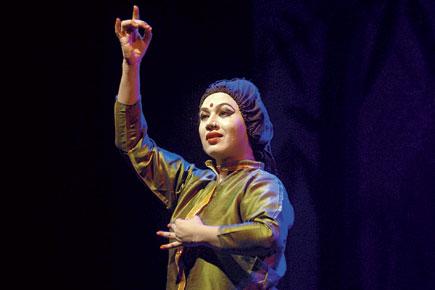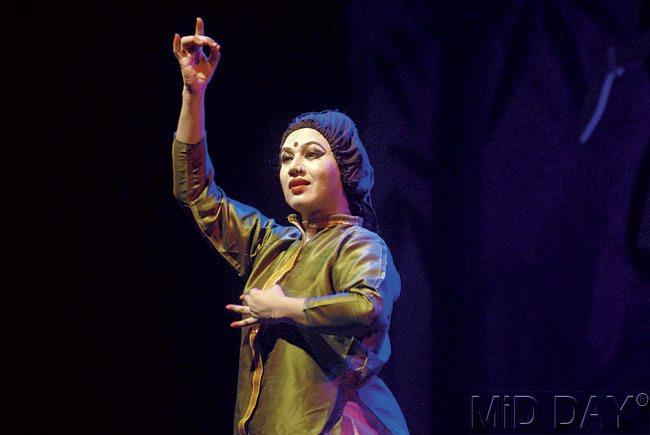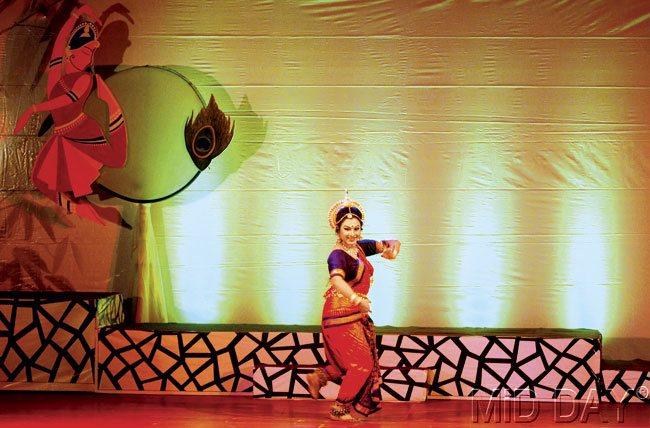Cancer survivor and Odissi dancer, Shubhada Varadkar is sending women a message that they ought to take better care of their health, through her performances

For Odissi dancer Shubhada Varadkar, November 2006 brought one of the biggest shocks of her life. While in London to perform at a show, Varadkar experienced some uneasiness and bleeding. When she got back to Mumbai she was diagnosed with ovarian cancer.
ADVERTISEMENT

Shubhada Varadkar performing Mayur Pank at Ravindra Natya Mandir. Pics/Pradeep Dhivar
Struggle
Speaking about the trauma of finding out she had cancer at 42, Varadkar says, "I was shocked at first and struggled to come to terms with it. Like me, my family also found it hard to accept the diagnosis. Fortunately, my cancer was in the first stage, so chemotherapy and treatment would work."
 For Varadkar, dance has become a source of strength and a medium to convey a message
For Varadkar, dance has become a source of strength and a medium to convey a message
Varadkar underwent treatment at Tata Memorial Hospital for six months and managed to keep performing through the illness and pain. "I underwent chemotherapy and then, three weeks later, was performing in the city. This was my set pattern for all six months of my treatment.
Dance is my passion and duty, when I am on stage I feel at home, the pain would all go away. I had a number of performances lined up and not many knew that I had cancer. I did not want to tell anyone about my illness and so I continued to dance in between the treatment," says the dance ace.
The energy to dance for hours after undergoing treatment for cancer came from the Bandra resident's belief in the power of dance. She says, "Dance to me is a beautiful, creative and expressive form that makes one immensely aware and helps inculcate positive thinking. It is my karma to dance. That kept my feet moving through the pain."
Power
Besides being a professional dancer, Varadkar who taught Economics at Ruia College in the early 90s, now conducts Odissi dance classes. She also, performs with her dance troupe that comprises her students. "I practice for two to five hours every day and on days when there are performances, I practice for eight to 12 hours. Since 2007, I have been cancer-free. I now lead a normal life," says Varadkar.
Mayur Pank, Varadkar's latest performance is based on her cancer struggle and borrows its name from the Marathi book she has penned on the same. "I sometimes do special shows in aid of cancer patients and have donated the proceeds to Tata Memorial Hospital. The disease drains out money from a patient. Not everyone can afford treatment and medicines. On and off I try to do my bit, use my talent to help those suffering from cancer," says Varadkar.
Hope
Varadkar says, "Many women are seeing family life in a new light after watching Mayur Pank. My message through this dance performance is clear in the hustle and bustle of life, women fail to give importance to themselves and hence, ignore their health. We need to take care of ourselves, too."
Noted Marathi writer, Gangaram Gavankar encouraged Varadkar to write about her cancer struggle. So did a woman she met at Tata Hospital during a check up. "The woman I met was very scared of undergoing cancer treatment; looking at her I opened up and told her my story. She came back to tell me that I had inspired her and given her courage to fight cancer.
This inspired me to speak to others about my cancer struggle. Mayur Pank, the book will be translated into English soon and my dance performances are continuing to inspire many. I am very happy that my life has become a source of strength for cancer patients in Mumbai," ends Varadkar.
 Subscribe today by clicking the link and stay updated with the latest news!" Click here!
Subscribe today by clicking the link and stay updated with the latest news!" Click here!






